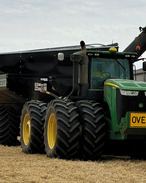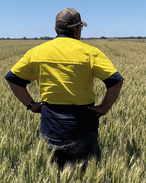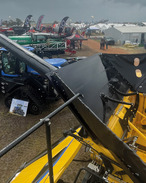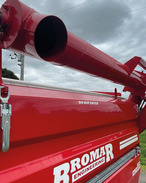The research was conducted by the Department of Primary Industries and Regional Development (DPIRD).
DPIRD says grower interest in long coleoptile wheat has increased with greater use of sowing deep to chase moisture and extend the seeding window, or with seeding soft soils following amelioration using strategic deep tillage.
A field experiment last year assessed the role of the long coleoptile trait in wheat to improve crop establishment, vigour and yield, and mitigate the risk of poor establishment from sowing too deep on ameliorated and non-ameliorated soil.
DPIRD senior soil research scientist, Dr Stephen Davies, will present the research, which is supported with co-investment from the Grains Research and Development Corporation (GRDC), at the Grains Research Update, to be held in Perth next week.
"The long-coleoptile trait ensured successful wheat establishment with deep sowing on yellow sandplain for both no-till control and ameliorated using ripping then rotary spading," Dr Davies said.
"Amelioration of deep yellow sand results in large yield increases even in a good season with a soft finish. These benefits are optimised with effective establishment of well-adapted varieties."
Four varieties of wheat with differing coleoptile lengths were sown at two seeding rates at both standard and deep (10-12cm) seeding depths on spaded and un-spaded sand at East Ogilvie, Northampton.
Varieties included short coleoptile Mace and a CSIRO developed line, Mace-18, with a long coleoptile trait associated with the use of the alternative Rht-18 dwarfing gene.
"This provided a direct comparison between Mace lines that are nearly identical genetically apart from a large difference in coleoptile length," Dr Davies said.
"Commercial wheat lines Scepter, with a short coleoptile, and Calibre with a relatively long coleoptile were also included."
Dr Davies said wheat grain yield from deep sowing was excellent for Mace-18, Scepter and Calibre, recording no yield penalty compared to standard depth sowing.
For short coleoptile Mace, deep sowing reduced grain yield by 0.6 t/ha, a 13 per cent reduction, compared to sowing at the standard depth.
"Soil amelioration increased grain yield regardless of sowing depth, with the commercial varieties and Mace-18 yielding 1.0 to 1.1 t/ha more than the average non-ameliorated control yield of 4.2 t/ha," Dr Davies said.
"Successful crop establishment on ameliorated soils ensures more rapid groundcover, and soil stabilisation reducing the erosion risk, maximises yield potential and increases crop competitiveness with weeds."
More project information is available from the GRDC website: https://bit.ly/3Iv7LJL
























